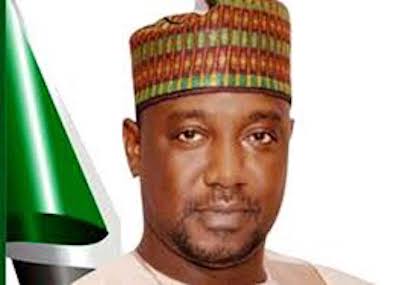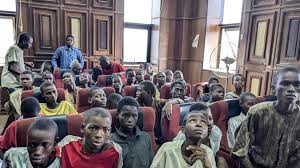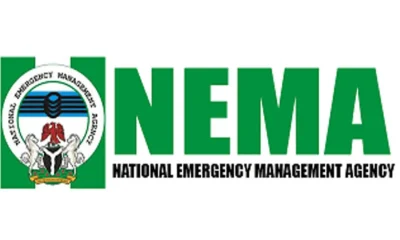Health
Niger Quarantines 27 in Isolation Centre.

From Dan Amasingha, Minna
As part of efforts aimed at halting the spread of the dreaded coronavirus through contact tracing, 27 persons have been quarantined by the Niger state government in an isolation centre in Minna.
DAILY ASSET gathered that the 27 person’s were quarantined following the suspicion that they might have contracted Coronavirus through contact with some patients that tested positive in Lagos.
The state commissioner of Health and Hospital services, Dr.
He explained that prior to the discovery of the quarantined suspects, the family members of one of those in isolation who is based in Lagos state, had made a telephone call to members of the family, based in Makera, in Mashegu local govrrnment area of the state on the travel record of the individual.
According to the Health commissioner, when the isolated man boarded his own vehicle and was traveling to Makera after arriving from Lagos state amidst serious coughs many had suspected that he might have had contacts with someone who had tested positive for Covid- 19 in Lagos therefore, he was prevented from travelling to his village for obvious reasons.
Dr. Makun Sidi, further stated that no sooner that the relations of the suspect in Makera community in Mashegu local government area of the state received the information about the poor health condition of the suspected COVID-19 patient that they in turn made a call to the state task force members at the government house Minna.
“We were contacted by the relations with the view to take him to an isolation centre as soon as we lay hands on him through our contact tracing mechanism,” he stated.
The Commissioner of Health and hospital services express gratitude to the people of the state for being at the vanguard in the fight against COVID- 19 stressing that their cooperation had gone a long way in easing the task of the state task force.
Sidi disclosed that when information got to the fleeing suspect that his village people were not ready to receive him he decided to divert his route.
“But the suspect who might have heard about the plans of his family members in Makera to disallow him access to his family house in the village, on his arrival at Makera, on Monday, he parked his private vehicle that he brought from Lagos somewhere within the village, disguised as an ordinary person and boarded a Canter Truck, that was traveling to Wushishi local government area of the state and with 26 people on board the vehicle.
” However, the state government was already ahead of him in their plans to get him arrested and to take him to an isolation centre, along sides the other 26 passengers whose lives he was endangering when he boarded their truck”
“The tracking system of the state government later intercepted them from Mashegu local government area of the state enroute Wushishi to the facility at the Social rehabilitation centre, Shanu village in Bosso local government area of the state, from where they were being quarantined since on Monday”.
He said, “basically, we have these 27 persons here that might have had contacts with the man who returned from Lagos and has been exhibiting some common symptoms of the virus, but envaded arrest”
The state taskforce member revelled that it has not been confirmed that they were positive of the pandemic but all the task force was doing is proactive measures to forestall the spread of the virus in the state.
“The issue is that he were coming from the epic centre and because of the directive of the World Health Organization ( WHO) and Nigeria centre for Disease Control ( NCDC) to quarantine such people that is why we are doing what we are doing “
They are being quarantined in order for them to obey the quarantine rules, in this isolated place at the Social Rehabilitation Centre, Minna for a minimum of 14 days and pending the outcome of the tests we conducted on them that has been taken for analysis at NCDC, in Abuja.
He however disclosed that the results of the tests conducted on the 27 persons with suspected corona virus symptoms were being expected in the state by next week, adding that the moment the Niger State Ministry of Health and Hospital Services get the results, will determine how long the people will stay at the Isolation centre.
Health
Nigeria, 7 others Begin African-led HIV Vaccine Development

Nigeria and seven other African countries have begun a project to check HIV in the continent.
The project is tagged, Bringing Innovation to cLinical and Laboratory research to end HIV In Africa through New vaccine Technology (BRILLIANT) for HIV vaccine research and development.
Prof Alash’le Abimiku, Executive Director, International Research Centre of Excellence, Institute of Human Virology (IHVN), disclosed this at a press briefing on Thursday in Abuja.
The theme of the briefing was, “HIV Vaccine, Innovation, Science, and Technology Acceleration in Africa (HIV-VISTA) study.
”Abimiku said that the countries involved were Nigeria, South Africa, Zambia, Zimbabwe, Tanzania, Uganda, Kenya, and Mozambique.
She said that the objective of the consortium is to evaluate HIV vaccine candidates emanating from the continent.
She added that the initiative was to harness and catalyse African scientists to contribute to an effective HIV vaccine.
“Through these efforts, African institutions will be encouraged to become more autonomous, generate domestic resource support, and form partnerships with the private sector.
“It will possibly create a more sustainable system for HIV vaccine research and development, which is progressively and inordinately dependent on the U.S government,” she said.
She expressed optimism that the partnership will acknowledge the potential of great innovation and science from Africa to solve global health challenges especially those that disproportionally devastate the continent.
Dr Temitope Ilori, Director-General, National Agency for the Control of AIDS (NACA), said that HIV still persisted in spite of efforts at controlling it, hence the need for new tools for prevention.
“The agency has continued to provide preventive measures, but an effective vaccine is crucial to our efforts.
“The BRILLIANT study offers hope for a vaccine tailored to the needs of our population, and Nigeria’s involvement in this global initiative is critical.
“Our participation supports both local and international efforts to end AIDS and brings us closer to a vaccine that could save countless lives across Africa and beyond,” she said.
She said that the BRILLIANT study exemplified the strength of global collaboration and scientific progress.
“Together, we can achieve our shared goal of eradicating HIV worldwide, and Nigeria is honoured to play a vital role in this endeavor,” she said.
Dr Ezekiel James, the Deputy Director of the office of HIV/TB from U.S. Agency for International Development (USAIDS), said that the study offered opportunity for stakeholders to combine efforts to achieve HIV epidemic control.
Similarly, Dr Leo Zekeng, UNAIDS Country Director, stressed the need to engage the community to create awareness of HIV vaccines and similar research that continues to break HIV transmission rates.
The World Health Organisation (WHO) had, on Tuesday, named HIV, malaria, Tuberculosis, and 14 other pathogens as top priorities for new vaccine development.
Also, according to UNAIDS, there are an estimated 39.9 million people living with HIV across the globe in 2023, with an estimated 1.3 million new infections.
Africa has about 25.9 million (65 per cent) of the global burden with Nigeria, contributing about 1.9 million, making it the fourth largest HIV burden country globally.
The USAIDS awarded more than 45 million dollars to the BRILLIANT consortium through a competitive process to implement a cooperative agreement under the BRILLIANT project. (NAN)
Health
WHO Unveils Nigeria’s First Climate Health Vulnerability, Adaptation Assessment Report

The World Health Organisation (WHO) unveiled Nigeria’s first-ever Climate Health Vulnerability and Adaptation Assessment Report (VA) during the Health Sector-Wide Joint Annual Review (JAR 2024) on Friday in Abuja.
The report underscores the urgent need for resilient health systems in the face of mounting climate risks.
The JAR serves as a vital platform for driving the Sector Wide Approach (SWAp) in Nigeria.
Delivering a goodwill message, Dr Walter Mulombo, WHO’s Head of Mission and Country Representative for Nigeria, said that climate change was the 21st century’s greatest health threat.
Mulombo expressed WHO’s continued dedication to Nigeria’s journey towards a climate-resilient health future.
“Rising temperatures, extreme weather events, and shifting disease patterns are already straining health systems, livelihoods, and well-being, especially among vulnerable populations.
“Together, we can protect Nigerians from the risks of a changing climate by building a health system that prioritizes resilience.” he said.
The report projects that climate factors could soon account for up to 21 per cent of Nigeria’s disease burden, underscoring the urgency of transformative action.
It serves as a foundational step for developing Nigeria’s Health National Adaptation Plan (HNAP), a strategic framework to guide national policies in mitigating climate-related health risks.
The WHO collaborated with the Nigerian government, FCDO, World Bank, and UNICEF to produce the report, which aligns with the Paris Agreement and COP26 Health Programme.
Since 2021, WHO has supported Nigeria’s commitment to a sustainable and climate-resilient health system, reinforcing initiatives like the training of over 382 health workers across all states on climate-health impacts.
This effort aims to build a strong health infrastructure capable of withstanding climate shocks, benefiting all Nigerians.
Report says that several local and international stakeholders, including donors and civil society organizations, were present at the launch event.
Several stakeholders applauded the new approach, with some stressing the importance of community engagement in the implementation of the reforms.(NAN)
Health
Millions of Children Experience Daily Domestic Violence in Schools, Homes Globally – WHO
Hundreds of millions of children and adolescents around the world face daily violence in their homes, schools, and elsewhere which could have lifelong consequences.The World Health Organisation (WHO) said this on Thursday.The violence includes being hit by family members, being bullied at school, as well as physical, emotional, and sexual violence, WHO said.
In most cases, violence occurs behind closed doors. More than half of those aged two to 17 or more than a billion minors in total experience violence each year according to the WHO. In three out of five children and adolescents, it is physical violence at home, with one in five girls and one in seven boys experiencing sexual violence.Between a quarter and half of minors are affected by bullying according to the information provided.Only half of the children reportedly talk about their experiences of violence and less than 10 per cent receive help.Lifelong consequences could include depression and anxiety disorders, or tobacco and drug use.As a result, many children do not reach their learning potential in school.Against the backdrop of being highly preventable, violence remains a horrific day-to-day reality for millions of children around the world leaving scars that span generations,” said Tedros Adhanom Ghebreyesus, WHO director general.The UN’s first conference on violence against children opened in Bogota, Columbia on Thursday.At the two-day conference, more than 100 countries pledged to find ways to better support overwhelmed parents and introduce school programmes against bullying and for healthy social behaviour.They also pledged to raise the minimum age for marriage.Some countries wish to generally ban children from being hit at school or home. (dpa/NAN)





























